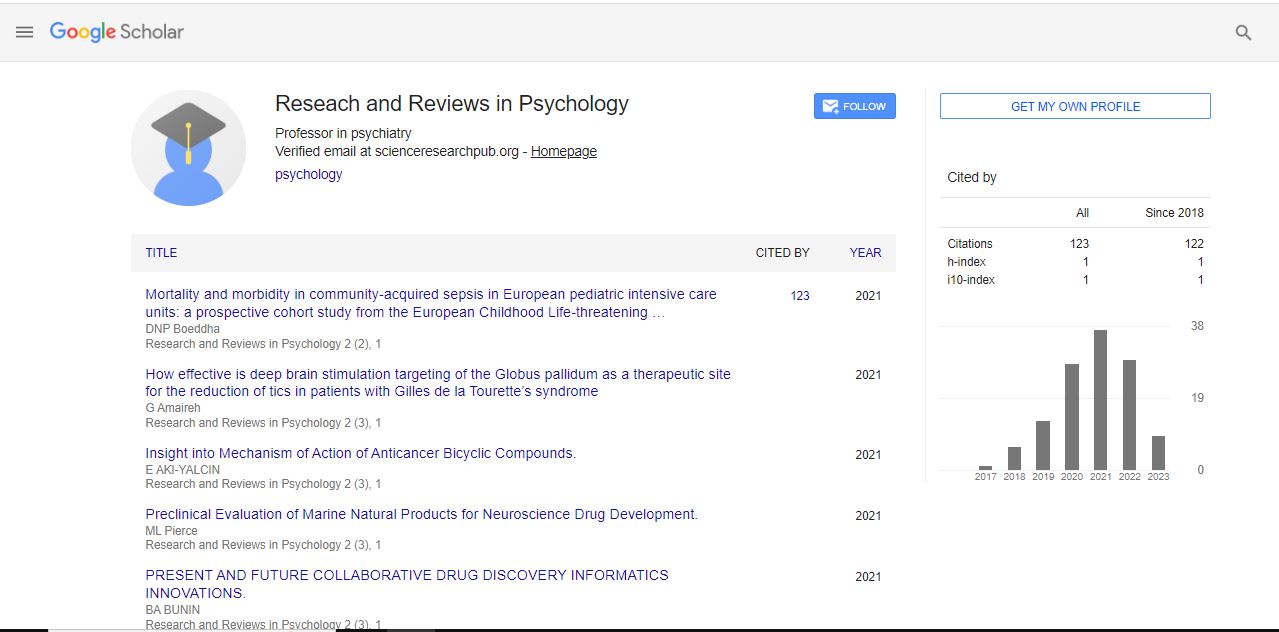Opinion Article, Res Rev Phys Vol: 4 Issue: 4
Mind-Body Connection: Integrative Approaches in Clinical Psychology
Olivia Kacle*
1Department of Psychiatry, University School of Medicine, Durham, USA
*Corresponding Author: Olivia Kacle,
Department of Psychiatry, University
School of Medicine, Durham, USA
E-mail: olive.kacle@usm.edu
Received date: 28 November, 2023, Manuscript No. RRPY-23-124309;
Editor assigned date: 30 November, 2023, Pre QC No. RRPY-23-124309 (PQ);
Reviewed date: 15 December, 2023, QC No. RRPY-23-124309;
Revised date: 22 December, 2023, Manuscript No. RRPY-23-124309 (R);
Published date: 29 December, 2023, DOI: 10.4182/rrpy.1000352
Citation: Kacle O (2023) Mind-Body Connection: Integrative Approaches in Clinical Psychology. Res Rev Phys 4:4.
Description
The mind-body connection is a fundamental aspect of human experience, and in the clinical psychology, it serves as a cornerstone for understanding and treating mental health conditions. This exploration delves into the intricate interplay between mental and physical well-being, examining how integrative approaches in clinical psychology leverage the mind-body connection to foster holistic healing and enhance overall health.
The mind-body connection begins at the neural level, where neurotransmitters play a pivotal role. Clinical psychology recognizes that emotional experiences are closely tied to neurotransmitter activity in the brain. For example, serotonin regulates mood, and imbalances can contribute to conditions like depression or anxiety. The interdisciplinary field of psychoneuroimmunology further underscores the mind-body connection. It explores the intricate links between psychological processes, the nervous system, and the immune system. Stress, for instance, can impact immune function, highlighting the profound influence of the mind on physical health. Integrative approaches often incorporate mindfulness-based interventions, emphasizing present moment awareness. Mindfulness practices, rooted in ancient contemplative traditions, have gained prominence in clinical psychology for their effectiveness in reducing stress, anxiety, and enhancing overall well-being.
Physical activities such as yoga and movement therapies bridge the mind and body. These practices not only promote physical health but also cultivate mental clarity and emotional balance. In clinical settings, they are harnessed to address conditions like trauma and chronic pain. Psychosomatic perspectives in clinical psychology acknowledge the manifestation of psychological distress in physical symptoms. Integrative clinicians explore the underlying psychological factors contributing to somatic expressions. Biofeedback techniques empower individuals to regulate physiological functions consciously. Through monitoring and feedback, individuals can learn to influence processes like heart rate and muscle tension. This integration of psychological awareness and physiological control exemplifies the bidirectional nature of the mindbody connection. Stress, a ubiquitous aspect of life, triggers hormonal responses that affect both mental and physical states. Cortisol, the stress hormone, is central to the stress response. Clinical psychologists employing integrative approaches explore strategies to modulate stress hormones, promoting resilience and adaptive coping.
Integrative approaches offer an array of mind-body techniques for stress reduction. These may include progressive muscle relaxation, guided imagery, and diaphragmatic breathing. By teaching clients these techniques, clinicians empower them to manage stress and mitigate its impact on mental and physical health. Chronic illnesses often intertwine with psychological well-being. Integrative clinical psychology, particularly through cognitive-behavioral approaches, addresses the complex relationship between chronic pain and mental health. By reshaping cognitive patterns, individuals can experience improvements in both realms. Psycho-oncology, an integral part of integrative clinical psychology, focuses on the psychological aspects of cancer care. Recognizing the emotional toll of cancer, clinicians employ various interventions to enhance coping strategies, reduce distress, and improve overall quality of life. The concept of neuroplasticity reveals the brain's capacity to adapt and change throughout life. Integrative approaches leverage cognitive training exercises to promote neuroplasticity, aiding individuals in developing healthier thought patterns and enhancing mental well-being. Trauma can leave lasting imprints on both the mind and body. Integrative clinical psychology embraces mind-body practices, such as traumainformed yoga or mindfulness, as complementary tools in trauma recovery. These approaches honor the interconnectedness of psychological and physiological healing.
Integrative clinical psychology embraces diverse healing traditions. Traditional Chinese Medicine, with its holistic philosophy, includes acupuncture as a mind-body intervention. This ancient practice is employed to address mental health concerns by balancing the flow of vital energy. Ayurveda, an ancient Indian system of medicine, classifies individuals based on their dosha or mind-body type. Integrative clinicians incorporate Ayurvedic principles to tailor interventions according to individual constitutions, recognizing the impact of mind-body types on mental well-being. As with any therapeutic approach, respecting client autonomy is paramount in integrative clinical psychology. Clinicians prioritize informed consent, ensuring that clients have a comprehensive understanding of the mindbody interventions proposed and actively participate in their care.
Cultural competence is central to ethical practice. Integrative clinicians acknowledge the diversity of cultural perspectives on health and well-being. Cultural sensitivity ensures that mind-body interventions are adapted and integrated in a manner that respects individual and collective cultural norms. The profound and intricate relationship between mental and physical well-being. This exploration underscores the bidirectional influence of the mind on the body and vice versa, emphasizing the holistic nature of integrative clinical psychology. By embracing diverse therapeutic modalities and acknowledging the interconnectedness of psychological and physiological processes, clinicians navigate the complexities of the human experience, fostering healing and well-being on multiple fronts. Integrative approaches stand as a testament to the understanding that true health encompasses the harmonious integration of the mind and body.
 Spanish
Spanish  Chinese
Chinese  Russian
Russian  German
German  French
French  Japanese
Japanese  Portuguese
Portuguese  Hindi
Hindi 